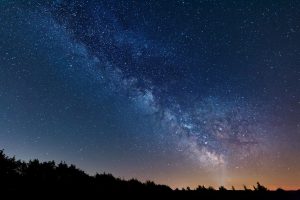Environment Minister Heinen-Esser: "The protection of the starry night sky serves health, species and climate protection and enables fascinating nature experiences at night".

Schleiden-Gemünd / Nettersheim, 05.04.2019. Experiencing the starry sky at night with twinkling celestial bodies is a special experience for many people that is now only possible in a few places in Germany - one of these places is the Eifel National Park. Since 2010, a regional initiative has been successfully campaigning for the protection of the night sky and the preservation of the natural night landscape - in 2014, this was followed by the provisional designation as the first "International Dark Sky Park" in Germany. Now this initiative can look forward to the final recognition as International Star Park Eifel National Park. On the grounds of the observatory of the astronomy workshop "Stars without Borders" in the Eifel National Park, Dr. Andreas Hänel, highest representative of the International Dark Sky Association (IDA) in Germany, presented the certificate of recognition to Environment Minister Ursula Heinen-Esser and the head of the Eifel National Park Administration Dr. Michael Röös. The distinction of being a protected area of the International Dark Sky Association (IDA) is a title that only a few regions worldwide can use to promote themselves, in Germany there are only four. For the Eifel National Park, which turned 15 this year, this recognition is a nice "birthday present".
The Eifel National Park is a refuge of undisturbed night skies and has been recognised as a star park since 2014. "Rarely does a topic offer so many win-win situations," said Environment Minister Ursula Heinen-Esser when handing over the certificate. She emphasised the many benefits of protecting the starry night sky: "Dark nights have a positive effect on health, conserve resources and thus help to protect the climate. Darkness is important for many nocturnal animal species, especially insects. Artificial light at night can be a serious threat to them." For North Rhine-Westphalia, he said, the final recognition of the Eifel National Park as the only star park in the entire western half of Germany was an outstanding honour. "The final recognition of the Eifel National Park as a star park helps to raise the profile of our state as a nature destination as well," the state environment minister summed up.
The initiative goes back to the astronomer and lighting consultant Harald Bardenhagen from Cologne, who managed to convince the region of the value of the starry sky. Initially, Bardenhagen found enthusiastic comrades-in-arms in the administration of the Eifel National Park, the district administration of Euskirchen, the national park towns of Schleiden and Heimbach, and those responsible for the Vogelsang property. However, until the final recognition as a Dark Sky Park, further efforts on different levels were necessary: In the design of the outdoor lighting to reduce the artificial light in the National Park and the directly surrounding villages or in the development of tourist offers for stargazing for the general public. The North Eifel Nature Park, in which the Eifel National Park is embedded, has also been intensively involved in this process.
Dr. Michael Röös, Head of the Eifel National Park Authority, thanked Mr. Bardenhagen for his unprecedented commitment against light pollution and his dedication to protecting the night sky and making it possible to experience it. "With the final recognition of the Eifel National Park as an International Star Park, we have reached an important milestone with the region and at the same time taken a pioneering role in the protection of darkness in North Rhine-Westphalia."
"Together we will significantly expand this unique selling point", Manfred Poth, Chairman of the North Eifel Nature Park, was pleased to say. With the innovative project application "Under the Tent of Stars - Eifel by Night", the nature park was able to prevail in the "Nature Park Competition.2021.NRW" of the NRW Ministry of the Environment and, for the first time in its history, took first place. "With the associated 400,000 euros in funding, the protection of darkness through public relations work, through educational offers of sustainable development and tourist infrastructure projects in the Eifel will experience a significant further development," explained Poth. More than 40 project partners, including the Eifel National Park Authority, want to participate in the realisation.
Left:
www.nationalpark-eifel.de/de/nationalpark-erleben/sternenpark/
Source: PM Nationalpark Eifel.de from 5.4.2019
Keywords: Awards, Procurement, DE-News, Artificial light, Near-natural open space design, News Blog NRW, Social / Culture, Transition Town, Wildlife/animal friendly construction, Aesthetics / Architecture / Building Culture, Ecology




